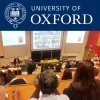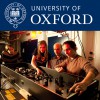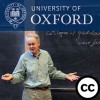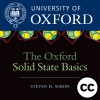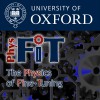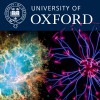Department of Physics

Relevant Links
Physics at Oxford aspire to be one of the best physics departments in the world by conducting cutting-edge research and by teaching and developing the careers of the next generation of physicists.
Physics work on major facilities worldwide, develop the most advanced experimental techniques and the most sophisticated theoretical methods to investigate nature at every scale.
Oxford University Physics Department pursues fundamental science and in doing so make discoveries that enable them to contribute directly to tackling the challenging problems facing society.
Series associated with Department of Physics
| # | Episode Title | Description | People | Date | |
|---|---|---|---|---|---|
| 125 | The impact of black holes on the Universe | Members of the Rudolf Peierls Centre for Theoretical Physics hosted the 5th morning of Theoretical Physics covering the subject of Black holes: where physics reaches its limit. | James Binney | 05 Nov 2014 | |
| 124 | Black holes in Einstein's gravity and beyond | Members of the Rudolf Peierls Centre for Theoretical Physics hosted the 5th morning of Theoretical Physics covering the subject of Black holes: where physics reaches its limit. | Andrei Starinets | 05 Nov 2014 | |
| 123 | Creative Commons | 21. Mean Field Theory and Closing Thoughts | Last in a series of 21 lectures on solid state physics, delivered by Professor Steven H. Simon in early 2014. | Steven H. Simon | 10 Sep 2014 |
| 122 | Creative Commons | 20. Collective Magnetism | Lecture 20 in a series of 21 lectures on solid state physics, delivered by Professor Steven H. Simon in early 2014. | Steven H. Simon | 10 Sep 2014 |
| 121 | Creative Commons | 19. Magnetic Properties of Atoms | Lecture 19 in a series of 21 lectures on solid state physics, delivered by Professor Steven H. Simon in early 2014. | Steven H. Simon | 10 Sep 2014 |
| 120 | Creative Commons | 18. Semiconductor Devices and Introduction to Magnetism | Lecture 18 in a series of 21 lectures on solid state physics, delivered by Professor Steven H. Simon in early 2014. | Steven H. Simon | 10 Sep 2014 |
| 119 | Creative Commons | 17. Dynamics of Electrons in Bands | Lecture 17 in a series of 21 lectures on solid state physics, delivered by Professor Steven H. Simon in early 2014. | Steven H. Simon | 10 Sep 2014 |
| 118 | Creative Commons | 16. Band Structure and Optical Properties of Solids | Lecture 16 in a series of 21 lectures on solid state physics, delivered by Professor Steven H. Simon in early 2014. | Steven H. Simon | 09 Sep 2014 |
| 117 | Creative Commons | 15. Nearly Free Electron Model | Lecture 15 in a series of 21 lectures on solid state physics, delivered by Professor Steven H. Simon in early 2014. | Steven H. Simon | 09 Sep 2014 |
| 116 | Creative Commons | 14. Waves in Reciprocal Space | Lecture 14 in a series of 21 lectures on solid state physics, delivered by Professor Steven H. Simon in early 2014. | Steven H. Simon | 09 Sep 2014 |
| 115 | Creative Commons | 13. Scattering Experiments III | Lecture 13 in a series of 21 lectures on solid state physics, delivered by Professor Steven H. Simon in early 2014. | Steven H. Simon | 09 Sep 2014 |
| 114 | Creative Commons | 12. Scattering Experiments II | Lecture 12 in a series of 21 lectures on solid state physics, delivered by Professor Steven H. Simon in early 2014. | Steven H. Simon | 09 Sep 2014 |
| 113 | Creative Commons | 11. Reciprocal Space and Scattering | Lecture 11 in a series of 21 lectures on solid state physics, delivered by Professor Steven H. Simon in early 2014. | Steven H. Simon | 09 Sep 2014 |
| 112 | Creative Commons | 10. Geometry of Solids II: Real Space And Reciprocal Space | Lecture 10 in a series of 21 lectures on solid state physics, delivered by Professor Steven H. Simon in early 2014. | Steven H. Simon | 09 Sep 2014 |
| 111 | Creative Commons | 09. Geometry of Solids I: Crystal Structure in Real Space | Lecture 9 in a series of 21 lectures on solid state physics, delivered by Professor Steven H. Simon in early 2014. | Steven H. Simon | 09 Sep 2014 |
| 110 | Creative Commons | 08. Microscopic View of Electrons in Solids in One Dimension: Tight Binding Chain | Lecture 8 in a series of 21 lectures on solid state physics, delivered by Professor Steven H. Simon in early 2014. | Steven H. Simon | 09 Sep 2014 |
| 109 | Creative Commons | 07. Microscopic View of Vibrations in Solids in One Dimension II: The Diatomic (Alternating) Harmonic Chain | Lecture 7 in a series of 21 lectures on solid state physics, delivered by Professor Steven H. Simon in early 2014. | Steven H. Simon | 09 Sep 2014 |
| 108 | Creative Commons | 06. Microscopic View of Vibrations in Solids in One Dimension I: The Monatomic Harmonic Chain | Lecture 6 in a series of 21 lectures on solid state physics, delivered by Professor Steven H. Simon in early 2014. | Steven H. Simon | 09 Sep 2014 |
| 107 | Creative Commons | 05. Chemistry in a Nutshell | Lecture 5 in a series of 21 lectures on solid state physics, delivered by Professor Steven H. Simon in early 2014. | Steven H. Simon | 09 Sep 2014 |
| 106 | Creative Commons | 04. Sommerfeld (Free Electron) Theory of Electrons in Metals | Lecture 4 in a series of 21 lectures on solid state physics, delivered by Professor Steven H. Simon in early 2014. | Steven H. Simon | 09 Sep 2014 |
| 105 | Creative Commons | 03. Drude Theory of Electrons in Metals / Sommerfeld (Free Electron) Theory of Electrons in Metals | Lecture 3 in a series of 21 lectures on solid state physics, delivered by Professor Steven H. Simon in early 2014. | Steven H. Simon | 09 Sep 2014 |
| 104 | Creative Commons | 02. Debye Model of Vibrations in Solids; Drude Theory of Electrons in Metals | Lecture 2 in a series of 21 lectures on solid state physics, delivered by Professor Steven H. Simon in early 2014. | Steven H. Simon | 09 Sep 2014 |
| 103 | Creative Commons | 01. Introduction to Condensed Matter; Einstein Model of Vibrations in Solids | First in a series of 21 lectures on solid state physics, delivered by Professor Steven H. Simon in early 2014. | Steven H. Simon | 09 Sep 2014 |
| 102 | Oxford Astrophysics | A video explaining what is Astrophysics and what's going on in Astrophysics at Oxford | Chris Lintott, Roger Davies, Jo Dunkley, katherine blundell | 22 Jul 2014 | |
| 101 | Creative Commons | Plants, Photosynthesis, and Solar Energy | The planet is in trouble; fossil fuels are being depleted and are contributing to global warming. Plants, however, have been directly harnessing solar energy for as long as they have existed. A flash talk from Tomas Leijtens. | Tomas Leijtens | 07 Jul 2014 |
| 100 | Creative Commons | Are we still in the dark about Dark Matter? | Kathryn boast gives a flash talk discussing what we already know about dark matter, and what we still have to find out about it. | Kathryn Boast | 07 Jul 2014 |
| 99 | Creative Commons | Einstein's Greatest Blunder | Albert Einstein is one of the greatest scientists to ever live, and even he made mistakes, as Luke Jew explains - A comforting thought for all of us! This great mistake was about the astrophysics that will ultimately determine how our universe will end. | Luke Jew | 07 Jul 2014 |
| 98 | Creative Commons | The Hare and the Tortoise | A flash talk given by Liam Brannigan about "Connecting the fast and slow parts of the climate system through the stormy upper ocean. " | Liam Brannigan | 07 Jul 2014 |
| 97 | Creative Commons | Quantum Measurement and Control: How to Roll a Six Everytime | In this flash talk Wojciech Kozlowski discusses the bizarre properties of measurement and how we can harness its probabilistic nature to produce results. | Wojciech Kozlowski | 07 Jul 2014 |
| 96 | Space - The Ultimate Laboratory | What can space teach us about the laws of physics? Space is huge and complicated. This is a challenge, but also gives us the ultimate physics lab. Francesca Day explores this further. | Francesca Day | 07 Jul 2014 | |
| 95 | Creative Commons | How the Universe Evolved From Smooth to Lumpy -- the Physics of Galaxy Formation | The 2014 Halley Lecture delivered by Professor Eliot Quataert | Eliot Quataert | 13 Jun 2014 |
| 94 | Creative Commons | Churchill, Oxford physicists and the Bomb | Physics Colloquium 30th May delivered by Graham Farmelo | Graham Farmelo | 11 Jun 2014 |
| 93 | Creative Commons | PT-symmetric Quantum Mechanics | Physics Colloquium 23rd May Delivered by Professor Carl M. Bender | Carl Bender | 02 Jun 2014 |
| 92 | Creative Commons | Galaxies and the Intergalactic Medium | 10th Dennis Sciama Memorial Lecture by Prof. James Binney. | James Binney | 22 May 2014 |
| 91 | Creative Commons | Turning in the Widening Gyre: Accretion Processes in the Universe | Inaugural Lecture by Professor Steven Balbus looking at the history of the universe | Steven Balbus | 07 Apr 2014 |
| 90 | Creative Commons | Lorenz Gödel and Penrose: new perspectives on determinism and unpredictability, from fundamental physics to the science of climate change | The 9th Dennis Sciama Memorial Lecture, looking at chaos theory and climate change | Tim Palmer | 07 Apr 2014 |
| 89 | Creative Commons | Building stars, planets and the ingredients for life between the stars | Halley Lecture 2013 by Professor Dr Ewine van Dishoeck on new developments in astronomy | Ewine van Dishoeck | 07 Apr 2014 |
| 88 | Creative Commons | The Fast Track to Finding an Inhabited Exoplanet | The 8th Hintze Lecture by Professor David Charbonneau looking at investigating habitable exoplanets. | David Charbonneau | 07 Apr 2014 |
| 87 | The SKA | Matt Jarvis discusses square kilometer array, commonly known as SKA, in this short Stargazing talk. | Matt Jarvis | 04 Feb 2014 | |
| 86 | Creative Commons | Lab, Camera, Action: Tides | The Bay of St Brieuc in Brittany has one of the largest tides on Earth. Dr Andrew Steele takes some time out of his holiday, on the day of the highest tide of the year, to find out why. | Andrew Steele | 03 Feb 2014 |
| 85 | Creative Commons | Lab, Camera, Action: Transit of Venus | In June of 2012, one of the rarest predictable astronomical phenomena took place: Venus passed directly in front of the Sun, as seen from Earth. For more information, visit transitofvenus.org. | Andrew Steele | 03 Feb 2014 |
| 84 | Creative Commons | Lab, Camera, Action: Maglev Train | Wheels are so last century. We’ve got a train set which doesn’t have any; it just floats around the track in a billowing cloud of steam. Dr Andrew Steele explains how our superconducting magnetic levitation—or maglev—train really works. | Andrew Steele | 03 Feb 2014 |
| 83 | Creative Commons | Lab, Camera, Action: Particle Accelerator | Dr Andrew Steele takes a look inside the ISIS particle accelerator in Oxfordshire, where scientists use neutrons to investigate the structure of materials, and accelerator physicist Dr Suzie Sheehy explains how this massive machine works. | Andrew Steele, Suzie Sheehy | 03 Feb 2014 |
| 82 | Creative Commons | Lab, Camera, Action: Make your own CD spectrometer | How do we know what the stars are made of when we've never been to one? Dr Andrew Steele shows us how to make a spectrometer, a device used by scientists to analyse light, using a cereal box and a CD. | Andrew Steele | 03 Feb 2014 |
| 81 | Is our galaxy special? | Chris Lintott looks at the distinctive features of our galaxy and whether it is really special. | Chris Lintott | 31 Jan 2014 | |
| 80 | Galaxy Zoo project | Becky Smethurst from the Zooniverse team outlines the Galaxy Zoo project that allows members of the public to classify new galaxies. | Becky Smethurst | 31 Jan 2014 | |
| 79 | Zooniverse: Live | Grant Miller and Becky Smethurst give a live demonstration of the Zooniverse tool and explain how it works. | Becky Smethurst, Grant Miller | 30 Jan 2014 | |
| 78 | Atmospheres in the solar system ... and beyond! | What is it like on the planets in our solar system? How hot are they? Is there any water? Jo Barstow explains this and more in her talk. | Jo Barstow | 30 Jan 2014 | |
| 77 | Creative Commons | Spin Doctors: Creating a planet's atmosphere in the lab | Roland Young discusses his work on studying and recreating the atmospheres of different planets in our solar system. | Roland Young | 30 Jan 2014 |
| 76 | Ancient Astronomies - 7000 years in the Kennett Valley | Charles Barclay gives a brief overview of the history of Astronomies and some of the fascinating insights that can be gained from these Ancient practices. | Charles Barclay | 29 Jan 2014 | |
| 75 | Colonisation of Mars - the Great Debate | Will there be humans living on Mars in the next 50 years? Is this a good thing, or something that should be completely avoided? Chris Lintott and Colin Wilson debate the pros and cons of this interesting topic. | Chris Lintott, Colin Wilson | 29 Jan 2014 | |
| 74 | Dark Matter - Are we still in the dark? | Kathryn Boast gives a talk about dark matter: what it is, what we know about it, and what the limitations of our knowledge are. | Kathryn Boast | 28 Jan 2014 | |
| 73 | Inflation - The "BANG" in Big Bang | Luke Jew talks about inflation, the process that scientists believe happened at the very start of our universe and is responsible for all the large scale structures that we see around us. | Luke Jew | 28 Jan 2014 | |
| 72 | Creative Commons | Earth-like Planets (and where to find them) | Ever wondered if another planet like our own exists in the vast expanse of space around us? Ruth Angus explains her exciting research into Extra Solar Planets (Exo-Planets) and why research in this area is important. | Ruth Angus | 28 Jan 2014 |
| 71 | Creative Commons | The Physics of the Violin | Jesse Liu, winner of the the departmental Speaking Competition for undergraduates, gives a short talk on the physics of a violin. | Jesse Liu | 13 Dec 2013 |
| 70 | Creative Commons | The coldest place in the Universe | Tiffany Harte, Oxford Physics, discusses absolute zero temperatures and how by cooling atoms in a lab we can aim to replicate the coldest place in the Universe. | Tiffany Harte | 13 Dec 2013 |
| 69 | Creative Commons | Heart of Darkness: The Interplay of Galaxies and Dark Matter | A short flash talk from Peter Hatfield, Oxford Physics, who discusses the origins of the galaxies we see in our night sky and the mysterious nature of dark matter. | Peter Hatfield | 13 Dec 2013 |
| 68 | Creative Commons | Superconductivity -- alchemy for the 21st Century? | An exciting talk and demonstration about superconductivity and its potential practical applications by Ben Williams, Oxford Physics. | Ben Williams | 12 Dec 2013 |
| 67 | Creative Commons | Sea Ice Growth: Mushy layers, Convection and Brinicles | Joe Hitchen, Oxford University Physics Department, describe the different stages of sea ice growth and the formation of hollow tubes of ice in the ocean known as brinicles. | Joe Hitchen | 12 Dec 2013 |
| 66 | Creative Commons | Matter, Antimatter and The Mystery of Existence | In this talk Nazim Hussain, Oxford University, will provide an introduction to matter and antimatter and the interplay between them. | Nazim Hussain | 12 Dec 2013 |
| 65 | Exoplanets | Exoplanets - a talk by Grant Miller. | Grant Miller | 12 Dec 2013 | |
| 64 | Are we special in the Universe? | Peter Hatfield asks if we are special in the Universe. | Peter Hatfield | 12 Dec 2013 | |
| 63 | Black Holes | A talk about Black Holes by Dr Brooke Simmons. | Brooke Simmons | 12 Dec 2013 | |
| 62 | Astrophotography | Mel Gigg, Chipping Norton Amateur Astronomy Group, showcases some of his astrophotography. | Mel Gigg | 05 Dec 2013 | |
| 61 | Cosmology - What We Don't Know | Chris Lintott talks about the unknown in the study of cosmology. | Chris Lintott | 05 Dec 2013 | |
| 60 | Galaxy Zoo | Galaxy Zoo is a Citizen Science project, part of the Zooniverse, which asks the public to classify the morphology of galaxies using images taken by Hubble and the Sloan Digital Sky Survey. | Rebecca Smethurst | 05 Dec 2013 | |
| 59 | How to find a Higgs boson | The discovery of the Higgs boson last summer is widely regarded as one of the most important scientific discoveries of our time. | David Hall | 04 Jun 2013 | |
| 58 | What is a Quantum Computer? | How does a quantum computer work? Why is a quantum computer so much better than a traditional computer? This talk will give you an insight into the strange features of the quantum world that we can exploit to develop a super fast quantum computer. | Michael Peterer | 04 Jun 2013 | |
| 57 | Dealing with Frustration - Order in Disorder | Magnetic particles can get frustrated in their interactions with other particles because of lattice geometry. Lots of new and exciting physics is involved in understanding how they deal with their frustration. | Zhiming Darren Tan | 04 Jun 2013 | |
| 56 | Masters of Nature? - The physics of trying to control the climate | The Earth's climate is changing; but what are we doing about it? The frustration felt all around the world at the inability to agree a meaningful deal on global carbon dioxide emission leaves people looking for alternatives. | Richard Millar | 04 Jun 2013 | |
| 55 | Light Fantastic: X-ray Laser Research in Oxford | David LLoyd describes how x-rays can be used for far more than identifying broken bones. | David Lloyd | 04 Jun 2013 | |
| 54 | Creative Commons | Extra-solar planets: from science-fiction to reality | Since the discovery of the first extra-solar planet in the '90s, our perspective of the Universe has changed. Over the last two decades a whole host of exotic planet systems have been found, including analogues of famous science-fiction-worlds. | Ruth Angus | 04 Jun 2013 |
| 53 | Creative Commons | Extra-solar planets: from science-fiction to reality | Since the discovery of the first extra-solar planet in the '90s, our perspective of the Universe has changed. Over the last two decades a whole host of exotic planet systems have been found, including analogues of famous science-fiction-worlds. | Ruth Angus | 04 Jun 2013 |
| 52 | Creative Commons | Uncovering Black Holes and Hunting for Planets | Dr Brooke Simmons talks about Black Holes and planet hunting. | Brooke Simmons | 16 Apr 2013 |
| 51 | The Chelyabinsk Meteor | In this talk Dr Ken Amor talks about the Chelyabinsk meteor, which entered Earths atmosphere over Russia on the 15th of February 2013. | Ken Amor | 16 Apr 2013 | |
| 50 | Stepping into the unknown: the search for new planets | Astrophysicist Dr Suzanne Aigrain talks about the search for extra-solar planets. | Suzanne Aigrain | 16 Apr 2013 | |
| 49 | A History of the Universe in 12 Minutes | From big bang to the present day, Chris Lintott summarises the history of the Universe in 12 minutes. | Chris Lintott | 16 Apr 2013 | |
| 48 | LOFAR and the SKA - The Universe in radio waves | In this talk Dr Matt Jarvis talks about radio astronomy. | Matt Jarvis | 16 Apr 2013 | |
| 47 | Killer asteroids | In this talk Jocelyn Bell Burnell talks about large asteroid impacts. | Jocelyn Bell Burnell | 16 Apr 2013 | |
| 46 | Pluto - no more a planet | In this talk Jocelyn Bell Burnell talks about the reclassification of Pluto to a Dwarf planet and the history of its discovery. | Jocelyn Bell Burnell | 16 Apr 2013 | |
| 45 | Astro Photography Showcase | Mel Gigg of the Chipping Norton Amateur Astronomy Group showcases some fantastic amateur astro-photography. | Mel Gigg | 16 Apr 2013 | |
| 44 | Creative Commons | Galaxies as a Plate of Fruit | Professor Roger Davies explains how we can learn about the different shapes of galaxies using a plate of fruit and a telescope. | Roger Davies | 05 Feb 2013 |
| 43 | Observing with the Naked Eye | Charles Barclay offers advice on how to get the most out of stargazing with the naked eye and the astronomical activities to look out for in the coming months. | Charles Barclay | 04 Feb 2013 | |
| 42 | Stargazing Open Day 2013 | In January 2013 over 1,000 people visited the Astronomy Open Day to meet scientists, hear the latest on research at Oxford and find out more about the stars. This video shows the range of hands-on activities that took place throughout the day. | Leigh Fletcher, Chris Lintott | 31 Jan 2013 | |
| 41 | Large Meteorite Impacts on Earth | Ken Amor looks at the science of large meteorite impacts on Earth. | Ken Amor | 30 Jan 2013 | |
| 40 | Creative Commons | Cosmology | Jo Dunkley reviews the latest research in Cosmology. | Jo Dunkley | 30 Jan 2013 |
| 39 | Creative Commons | Robotic Planetary Exploration | Leigh Fletcher shows how we can use robots to discover more about the planets. | Leigh Fletcher | 30 Jan 2013 |
| 38 | Creative Commons | Planets, Planets Everywhere! | Dr Chris Lintott, University of Oxford, gives an overview of the discoveries made about the many billions of exo-planets - the planets that surround stars. | Chris Lintott | 17 Jan 2013 |
| 37 | Creative Commons | Radiation and Reason | Professor Wade Allison gives a talk about his book 'Radiation and Reason; The Impact of Science on a Culture of Fear'. | Wade Allison | 14 Nov 2012 |
| 36 | Creative Commons | Physics and Philosophy: An Introduction | On the inextricable links between physics and philosophy and the ways in which one can lead to the other - how they complement each other in answering the big questions. | Ankita Anirban | 30 Jul 2012 |
| 35 | Creative Commons | From Argument to Experiment | Dr Christopher Palmer on the historical ties between physics and philosophy - from ancient philosophical thought through to the scientific revolution and the pioneers of modern physics. | Christopher Palmer, Ankita Anirban | 30 Jul 2012 |
| 34 | Creative Commons | Space and Time | Prof. Frank Arntzenius on whether space and time are absolute entities or simply relational properties derived from the idea of motion - an old debate between Newton and Leibniz, carried on today. | Frank Arntzenius, Ankita Anirban | 30 Jul 2012 |
| 33 | Creative Commons | Quantum Paradoxes | Prof. Vlatko Vedral on the mind-boggling and paradoxical nature of quantum mechanics and its consequences on modern technology - the possibilities of superfast computing and teleportation. | Vlatko Vedral, Ankita Anirban | 30 Jul 2012 |
| 32 | Creative Commons | Parallel Worlds | Dr. David Wallace on the many-worlds theory, an explanation of the baffling results that quantum mechanics provides us with - and that there may be more worlds than just our own. | David Wallace, Ankita Anirban | 30 Jul 2012 |
| 31 | Creative Commons | Consciousness and Computability | Prof. Sir Roger Penrose on the idea of artificial intelligence and whether consciousness can be replicated by a computer - a discussion of new physics which may take us closer to explaining the mind. | Roger Penrose, Ankita Anirban | 30 Jul 2012 |
| 30 | Creative Commons | Higgs boson-like particle discovery claimed at the Large Hadron Collider | Scientists at the Large Hadron Collider claim the discovery of the Higgs boson particle. Alan Barr of Oxford's Physics department, UK physics coordinator for LHC's ATLAS experiment, describes what it means for science. | Alan Barr, Steven Legg | 05 Jul 2012 |
| 29 | Creative Commons | 027 Hydrogen part 3 Eigenfunctions | Twenty seventh lecture in Professor James Binney's Quantum Mechanics Lecture series given in Hilary Term 2010. | James Binney | 05 Mar 2010 |
| 28 | Creative Commons | 026 Hydrogen part 2 Emission Spectra | Twenty sixth lecture in Professor James Binney's Quantum Mechanics Lecture series given in Hilary Term 2010. | James Binney | 05 Mar 2010 |
| 27 | Creative Commons | 025 Hydrogen part 1 | Twenty fifth lecture in Professor James Binney's Quantum Mechanics Lecture series given in Hilary Term 2010. | James Binney | 05 Mar 2010 |
| 26 | Creative Commons | 024 Classical Spin and Addition of Angular Momenta | Twenty fourth lecture in Professor James Binney's Quantum Mechanics Lecture series given in Hilary Term 2010. | James Binney | 05 Mar 2010 |
- ‹ previous
- 4 of 5
- next ›


